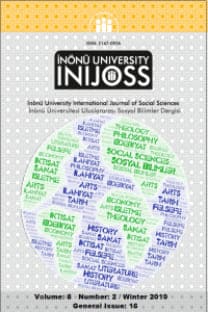CARNIVAL, LIBERTINISM, SEXUALITY, AND THE REPRESENTATION OF THE RESTORED KING IN APHRA BEHN’S THE ROVER
libertinism, carnival, sexuality, restoration comedy of manners, AphraBehn, Restoration, Charles II, power struggle, female subjectivity.
___
1. "Additional Information on Charles II (b.1630 R.1660-1685)." (n.d.). Retrieved November 22, 2014, from <http://www.explore-parliament.net/nssMovies/04/0458/0458_.htm>.2. Bakhtin, Mikhail. (1984) Rabelais and His World. (Helene Iswolsky, Trans.). Indianapolis: Indiana University Press.
3. Barnet, Sylvan. (Eds., et al). (2000) Types of Drama. New York: Longman.
4. Beach, Adam R. (2004) "Carnival Politics, Generous Satire, and Nationalist Spectacle in Behn’s The Rover." Eighteenth-Century Life 28(3), 1. Retrieved October 10, 2014, from Project MUSE database <https://muse.jhu.edu/journals/eighteenthcentury_life/v028/28.3beach.html>
5. Behn, Aphra. (1995). The Rover. (Marion Lomax, Ed.). London: A&C Black New Mermaids.
6. Behn, Aphra (1999) (Simon Trussler, and John Barton, Eds.). The Rover or, the Banished Cavaliers. Peterborough, Ont: Broadview Press.
7. Danow, David Keevin. (1995). The Spirit of Carnival: Magical Realism and the Grotesque. Lexington: The University Press of Kentucky.
8. De Krey, Gary S. (2007). "The Culture of the Court." Restoration and Revolution in Britain. Hampshire: Palgrave Macmillan.
9. Fletcher Bellinge, Martha. (n.d.) "Restoration Drama." Theatre History. New York: Henry Holt and Company, 1927. Retrieved November 22, 2014, from <http://www.theatrehistory.com/british/restoration_drama_001.html>
10. Gorfain, Phyllis. (1998). “Towards a Theory of Play and the Carnivalesque in Hamlet.” Shakespeare and Carnival: After Bakhtin. (Ronald Knowles, Ed.). London: Macmillan Press Ltd.
11. Harris, Tim. (2005, June). “Charles II: The Reality Behind the Merry Monarchy." History Today. 55 (6). Retrieved October 21, 2014, from <http://www.historytoday.com/tim-harris/charles-ii-reality-behind-merry-monarchy> 12. Holmesland, Oddvar. (2013). Utopian Negotiation: Aphra Behn and Margaret Cavendish.
Syracuse: Syracuse University Press. Retrieved October 23, 2014, from Project MUSE database <https://muse.jhu.edu/books/9780815652083>
13. Lombardi, Esther. (2014, November 20). “Spy Turned Writer - Aphra Behn”. Abouteducation. Message posted to <http://classiclit.about.com/od/behnaphra/a/aa_spy_abehn.htm>
14. Longsttafe, Stephen. (1998). “A Short Report and Not Otherwise: Jack Cade in 2 Henry VI.” Shakespeare and Carnival: After Bakhtin. (Ronald Knowles, Ed.). London: Macmillan Press Ltd.
15. Nelson, Christopher W. (2012, January). "Perception, Power, Plays and Print: Charles II and the Restoration Theatre of Consensus." Louisiana State University. Retrieved October 7, 2014, from < http://etd.lsu.edu/docs/available/etd-04262012-221519/>
16. Savile, George, Marquis of Halifax. (1750) A Character of King Charles the Second: And Political, Moral and Miscellaneous Thoughts and Reflections. London: J. and R. Tonson and S. Draper in the Strand.
17. Southcombe, George, and Grant Tapsell. (2010). Restoration Politics, Religion and Culture. New York: Palgrave Macmillan.
18. Staves, Susan. (2004). “Behn, Women, and Society.” The Cambridge Companion to Aphra Behn. Eds. Derek Hughes and Janet Todd. Cambridge, UK New York: Cambridge University Press. 12-28.
19. Stott, Andrew McConnell. (2005). Comedy. New York: Routledge.
20. Szilagyi, Stephen. (1998). "The Sexual Politics of Behn's "Rover": After Patriarchy." Studies in Philology, 95(4), 435-55. Retrieved from JSTOR database <http://www.jstor.org/stable/4174621>.
21. "The Rover." (2003). Drama for Students. Retrieved October 7, 2014 from Encyclopedia.com. <http://www.encyclopedia.com>
22. Thirsk, Joan. (1976). The Restoration. London: Oxford.
23. Webster, Jeremy W. (2012). "In And Out Of The Bed-Chamber: Staging Libertine Desire In Restoration Comedy." Journal for Early Modern Cultural Studies 12(2), 77-96. Retrieved October 9, 2014, from MLA International Bibliography https://muse.jhu.edu/journals/journal_for_early_modern_cultural_studies/v012/12.2.webster.pdf
24. Wiseman, S. J. (1996). Aphra Behn. Plymouth: Northcote House in Association with the British Council.
25. "Women in the Restoration Theatre." (n.d.) Politics, Literary Culture, & Theatrical Media in London. Retrieved October 21, 2014, from <http://www.london.umb.edu/index.php/entry_detail/women_in_the_restoration_theatre/theatre_intro/>
- ISSN: 2147-0936
- Yayın Aralığı: Yılda 2 Sayı
- Yayıncı: İnönü Üniversitesi
A KOHUTIAN APPROACH TO “A BIT OF SINGING AND DANCING” BY SUSAN HILL
FROM A JOURNEY OF INNER STRUGGLE TO A CATASTROPHE: ^ HENRIK IBSEN’S HEDDA GABLER
GENSLER’S STAR TEST AND SOME EXAMPLES OF ITS APPLICATION
FICTION OR PRECONCEPTION: THE ‘APE’ ALLEGORY IN ROSE MACAULAY’S THE TOWERS OF TREBIZOND
THE LIFELONG IMPACTS OF ADOLESCENT TRAUMA IN THE SAFFRON KITCHEN
QUEERING THE SPHERE IN BROKEBACK MOUNTAIN: HOMOSEXUAL BODY IN NATURE
Bünyamin AKDEMİR, Bayram KIRMIZIGÜL
DUAL NATURE OF VIOLENCE AND DIVIDED SELF OF MAN IN THE POEMS OF TED HUGHES
